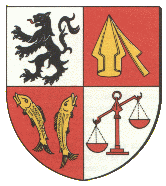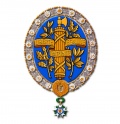Guewenheim: Difference between revisions
Knorrepoes (talk | contribs) m (Text replacement - "center[[Category:|alt-" to "center|alt=") |
Knorrepoes (talk | contribs) m (Text replacement - "↵↵'''" to "'''") |
||
| (9 intermediate revisions by the same user not shown) | |||
| Line 1: | Line 1: | ||
'''GUEWENHEIM''' | '''GUEWENHEIM''' | ||
Département : [[Haut-Rhin]] | Département : [[Haut-Rhin]] | ||
[[File:guewenheim.gif|center|alt=Blason de {{PAGENAME}} / Arms of {{PAGENAME}}]] | [[File:guewenheim.gif|center|alt=Blason de {{PAGENAME}}/Arms (crest) of {{PAGENAME}}]] | ||
{| class="wikitable" | {| class="wikitable" | ||
| Line 11: | Line 9: | ||
|- | |- | ||
|'''French''' | |'''French''' | ||
| | | Écartelé: au 1er d'argent au lion de sable armé et lampassé de gueules, au 2e de gueules au soc de charrue d'or posé en pal la pointe vers le haut et appointé à un coutre du même posé en bande, au 3e de gueules à deux bars adossés d'or, au 4e d'argent à la balance potencée de gueules, le balancier posé en barre. | ||
Écartelé: au 1er d'argent au lion de sable armé et lampassé de gueules, au 2e de gueules au soc de charrue d'or posé en pal la pointe vers le haut et appointé à un coutre du même posé en bande, au 3e de gueules à deux bars adossés d'or, au 4e d'argent à la balance potencée de gueules, le balancier posé en barre. | |||
|- | |- | ||
|'''English''' | |'''English''' | ||
| | | blazon wanted | ||
|} | |} | ||
| Line 21: | Line 18: | ||
The lion is taken from the arms of the abbey of Masevaux. This abbey possessed grounds in Guewenheim, and the court of the abbey held once a year a session in Guewenheim, which is symbolised by the scales. The ploughs are a symbol for agriculture and are the old village symbol. The fish are derived from the arms of the counts of Ferrette, who historically played a major role in Guewenheim. | The lion is taken from the arms of the abbey of Masevaux. This abbey possessed grounds in Guewenheim, and the court of the abbey held once a year a session in Guewenheim, which is symbolised by the scales. The ploughs are a symbol for agriculture and are the old village symbol. The fish are derived from the arms of the counts of Ferrette, who historically played a major role in Guewenheim. | ||
{{fr}} | |||
{{media}} | {{media}} | ||
[[Civic Heraldry Literature - France|Literature]] : Image taken from <a href=http://cdhf.telmat-net.fr/villages>here]], with permission. Background from Richard Ulrich | [[Civic Heraldry Literature - France|'''Literature''']]: Image taken from <a href=http://cdhf.telmat-net.fr/villages>here]], with permission. Background from Richard Ulrich | ||
[[Category:French Municipalities G]] | [[Category:French Municipalities G]] | ||
[[Category:Haut-Rhin]] | [[Category:Haut-Rhin]] | ||
Latest revision as of 14:12, 7 January 2024
GUEWENHEIM
Département : Haut-Rhin
| French | Écartelé: au 1er d'argent au lion de sable armé et lampassé de gueules, au 2e de gueules au soc de charrue d'or posé en pal la pointe vers le haut et appointé à un coutre du même posé en bande, au 3e de gueules à deux bars adossés d'or, au 4e d'argent à la balance potencée de gueules, le balancier posé en barre. |
| English | blazon wanted |
Origin/meaning
The lion is taken from the arms of the abbey of Masevaux. This abbey possessed grounds in Guewenheim, and the court of the abbey held once a year a session in Guewenheim, which is symbolised by the scales. The ploughs are a symbol for agriculture and are the old village symbol. The fish are derived from the arms of the counts of Ferrette, who historically played a major role in Guewenheim.
French heraldry portal
This page is part of the French heraldry portal |
Heraldry of the World |
|
French heraldry:
Overseas territories:
|
Selected collector's items from France:
|
Contact and Support
Partners:
Your logo here ?
Contact us
© since 1995, Heraldry of the World, Ralf Hartemink
Index of the site
Literature: Image taken from <a href=http://cdhf.telmat-net.fr/villages>here]], with permission. Background from Richard Ulrich


